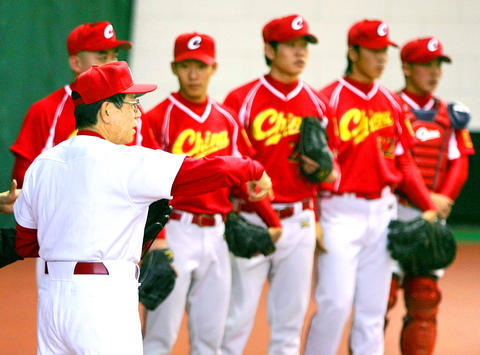Japanese Prime Minister Yasuo Fukuda enjoyed a round of baseball diplomacy with his Chinese counterpart Wen Jiabao (
Fukuda and Wen smiled in front of the cameras while playing catch with a baseball following a breakfast meeting on the third day of the Japanese leader's landmark visit to China.
Fukuda held talks with Wen and President Hu Jintao (胡錦濤) on Friday to lay the groundwork for closer cooperation between the countries in trade, climate change and other fields, but a dispute over maritime gas fields remained unresolved.

PHOTO: AFP
"I have asked Prime Minister Wen to play catch with me," Japanese officials quoted Fukuda as telling Wen during a meeting on Friday.
"I'm glad to play with you whenever," Wen replied, prompting laughter by diplomats of the two countries.
Fukuda is on a four-day visit aimed at deepening ties between the two Asian giants that has long been wracked over Japan's World War II invasion of China.
In Friday talks, the two countries agreed to continue to negotiate a territorial dispute over lucrative gas fields in the East China Sea and raise discussions to the vice-ministerial level in order to bring a "quick" solution.
Prior to his trip, Fukuda had expressed hopes that the resolution of the dispute could be reached during the visit.
Eleven rounds of negotiations on the gas fields since 2004 have made little progress, with China rejecting the maritime border which Japan considers a starting point for discussions.
After departing Beijing yesterday, Fukuda was scheduled to visit Tianjin before a trip to the ancestral home of ancient Chinese philosopher Confucius (
In Tianjin, Fukuda will inspect Japanese investments, including a Toyota Motor Corp plant and have lunch with the city's Communist Party boss Zhang Gaoli (
China cut high-level contacts with Japan during Junichiro Koizumi's terms as prime minister from 2001 until last year over his visits to Tokyo's Yasukuni shrine, which venerates war criminals who invaded China, alongside another 2.5 million war dead.
Fukuda -- whose father, late prime minister Takeo Fukuda, signed a landmark friendship treaty with China in 1978 -- and his predecessor, Shinzo Abe, have stayed away from the shrine, paving the way for the dramatic thaw in bilateral relations.
In Japan, newspapers yesterday applauded the thawing of ties between Japan and China.
The influential Asahi Shimbun hailed the four-day trip as successful and pointed to a "leap forward" in bilateral ties between the Asian powers.
"The time has come when we can talk about the `leap forward,'" the newspaper said in an editorial referring to a phrase that Fukuda has used.
The leading business Nikkei Shimbun was more skeptical.
Although it agreed "top-level diplomacy" appeared back on track, it lamented that "the pending issue over gas fields has been virtually put off."
"It is regrettable that the issue was not solved by the top leaders," it said.
"Although nearly 5 million people from Japan and China visit each other's country every year nowadays, mutual confidence in a true sense has not been enhanced," the Nikkei said. "We wish to see a first step in a `leap forward' in Japan-China relations through steady exchanges at various levels."
The mass-circulation Yomiuri Shimbun said both countries should find "mutually acceptable ideas" on the gas field issue, including areas where they can jointly develop gas, before Hu visits Tokyo next year.
The conservative Sankei Shimbun called on both countries to build an "irreversible, sustainable, genuine reciprocal relationship" and questioned China's commitment to improved relations.
It demanded China stop "anti-Japanese education," pointing to an increase in exhibits at a Chinese museum emphasizing the brutality of Japanese troops during their aggression in China.
"There is a question mark over China's true intentions," it said.

Australia has announced an agreement with the tiny Pacific nation Nauru enabling it to send hundreds of immigrants to the barren island. The deal affects more than 220 immigrants in Australia, including some convicted of serious crimes. Australian Minister of Home Affairs Tony Burke signed the memorandum of understanding on a visit to Nauru, the government said in a statement on Friday. “It contains undertakings for the proper treatment and long-term residence of people who have no legal right to stay in Australia, to be received in Nauru,” it said. “Australia will provide funding to underpin this arrangement and support Nauru’s long-term economic

‘NEO-NAZIS’: A minister described the rally as ‘spreading hate’ and ‘dividing our communities,’ adding that it had been organized and promoted by far-right groups Thousands of Australians joined anti-immigration rallies across the country yesterday that the center-left government condemned, saying they sought to spread hate and were linked to neo-Nazis. “March for Australia” rallies against immigration were held in Sydney, and other state capitals and regional centers, according to the group’s Web site. “Mass migration has torn at the bonds that held our communities together,” the Web site said. The group posted on X on Saturday that the rallies aimed to do “what the mainstream politicians never have the courage to do: demand an end to mass immigration.” The group also said it was concerned about culture,

ANGER: Unrest worsened after a taxi driver was killed by a police vehicle on Thursday, as protesters set alight government buildings across the nation Protests worsened overnight across major cities of Indonesia, far beyond the capital, Jakarta, as demonstrators defied Indonesian President Prabowo Subianto’s call for calm. The most serious unrest was seen in the eastern city of Makassar, while protests also unfolded in Bandung, Surabaya, Solo and Yogyakarta. By yesterday morning, crowds had dispersed in Jakarta. Troops patrolled the streets with tactical vehicles and helped civilians clear trash, although smoke was still rising in various protest sites. Three people died and five were injured in Makassar when protesters set fire to the regional parliament building during a plenary session on Friday evening, according to

CRACKDOWN: The Indonesian president vowed to clamp down on ‘treason and terrorism,’ while acceding to some protest demands to revoke lawmaker benefits Protests in Indonesia over rising living costs and inequality intensified overnight, prompting Indonesian President Prabowo Subianto to cancel a planned trip to China, while demonstrators reportedly targeted the homes of the finance minister and several lawmakers. Rioters entered Indonesian Minister of Finance Sri Mulyani Indrawati’s residence near Jakarta early yesterday, but were repelled by armed forces personnel, Kompas reported. Items were taken from the homes of lawmaker Ahmad Sahroni and two others, according to Detik.com. The reports of looting could not be independently verified, and the finance ministry has not responded to requests for comment. The protests were sparked by outrage over